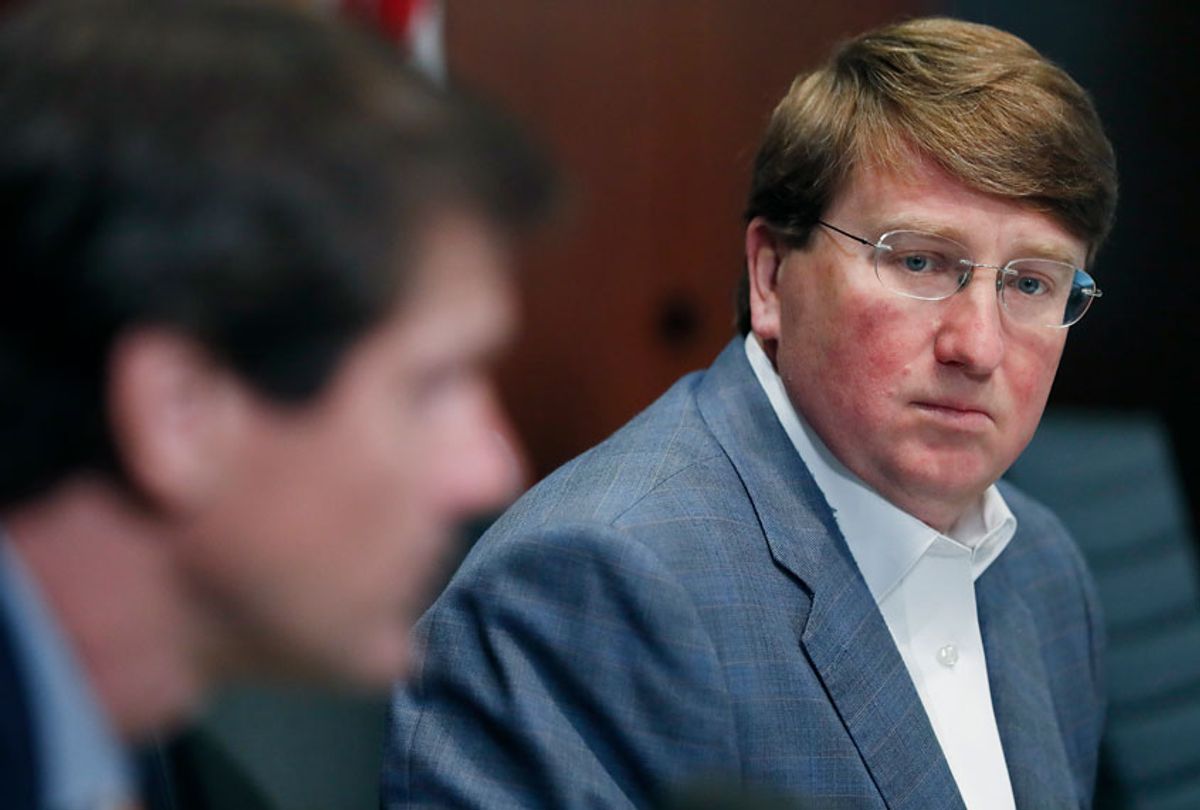Texas' experience of last month's deadly winter storm may have grabbed headlines, but its neighbors fared just as badly. Two weeks after the storm first touched Mississippi — and one week after the state's governor announced that he would "restore clean water" — thousands of residents in the capital city, Jackson, are still without water; even those lucky enough to have running water are officially advised to boil it before use. City officials have reported that impassable roads have prevented them from obtaining the chemicals necessary to treat the water, and that the city's distribution system was overwhelmed trying to deliver water to so many people at once, given how many were left homebound by the storm.
Some parts of the state were as cold as 20 degrees F, the coldest recorded temperature in Mississippi history. Hundreds of thousands of state residents suffered power outages, unheated homes, and water shutoffs as pipes froze, water treatment sites lost power and leaked, and energy providers failed to meet demand. At least five Mississippians died as a result of the storm.
Governor Tate Reeves blamed the state's difficulties on aging infrastructure, including poor building insulation and an outdated water system. The water system problems, he said in a press conference, date back to "50 years of negligence and ignoring the challenges of the pipes and the system." Large portions of the state get some of their water from the Mississippi River, which for years has been contaminated by wastewater, agricultural runoff, and fertilizer. The state's water treatment system has been plagued by frequent water main breaks, century-old pipes, and a failure to weatherize plants' equipment. Residents have long recognized these problems; for years, a souvenir t-shirt has brandished the phrase "Welcome to Boil Water Alert, Mississippi." So it came as no surprise when Reeves told residents not to expect overnight fixes.
Candace Abdul-Tawwab, assistant director of the Jackson-based People's Advocacy Institute, or PAI, told Grist that local and state leaders need to better prepare the state's infrastructure, roads, buildings, and natural lands from the threats posed by climate change. Early signs of a robust government response were not encouraging: Shortly after February's storm hit, Jackson Mayor Chokwe Antar Lumumba, a Democrat, accused Republican Governor Reeves of not answering his calls for support. The state's climate challenges will only become more pressing: Mississippi, the state with the largest share of Black residents in the country, faces some of the nation's most severe threats from extreme heat and coastal flooding.
"Everyone should be looking at the South right now, especially communities of color in the South, to see what climate change is doing and going to continue doing in America," Abdul-Tawwab told Grist. "These issues existed long before the winter storm and the attention focused on Texas."
Though PAI's work is focused broadly on issues like criminalization and economic inequality, Abdul-Tawwab said that environmental justice inevitably figures into the organization's work, given the challenges facing Jackson and other poor Black communities throughout the U.S. While President Joe Biden's federal disaster declaration was limited to Texas, PAI and other community organizations helped Mississippians access food, water, and shelter after they were left in the dark. In the past two weeks, PAI has crowdsourced funds to help house uprooted families in hotels, deliver water bottles to homes, and shop for everything from baby diapers to fresh fruit for those unable to trek through roads made impassable by snow and ice.
"Mississippi is often overlooked. We're a poorer state than Texas, but why didn't we get the same attention?" Abdul-Tawwab said. "In America, wherever Black people are, you're going to find the most neglect and intensifying of issues."
Jackson, a city with one of the largest percentages of Black people in the country and a poverty rate that is nearly three times the national average, bears a disproportionate share of both economic and environmental burdens. According to the Environmental Protection Agency's environmental justice screening tool, which maps pollution vulnerabilities across the country, Jackson residents are in the 95th percentile for cancer risk from air pollution and live closer to polluted water sources than 70 percent of the country. Overall, Black Americans are 75 percent more likely than others to live near facilities that produce hazardous waste.
"Without intervention, these natural disasters will wipe out any chance of us being able to even try to continue to make it," said Abdul-Tawwab.
That intervention does not appear to be forthcoming: Jackson city officials estimate the costs for water system upgrades, namely weatherizing equipment at water plants and replacing old pipes, to be $2 billion, but they've admitted they don't have the financial means to perform the updates. And even though many residents still lack basic utilities that could allow them to avoid COVID-19 exposure, Governor Reeves announced Tuesday that the state is lifting all rules relating to business capacity and all county mask mandates.


Shares